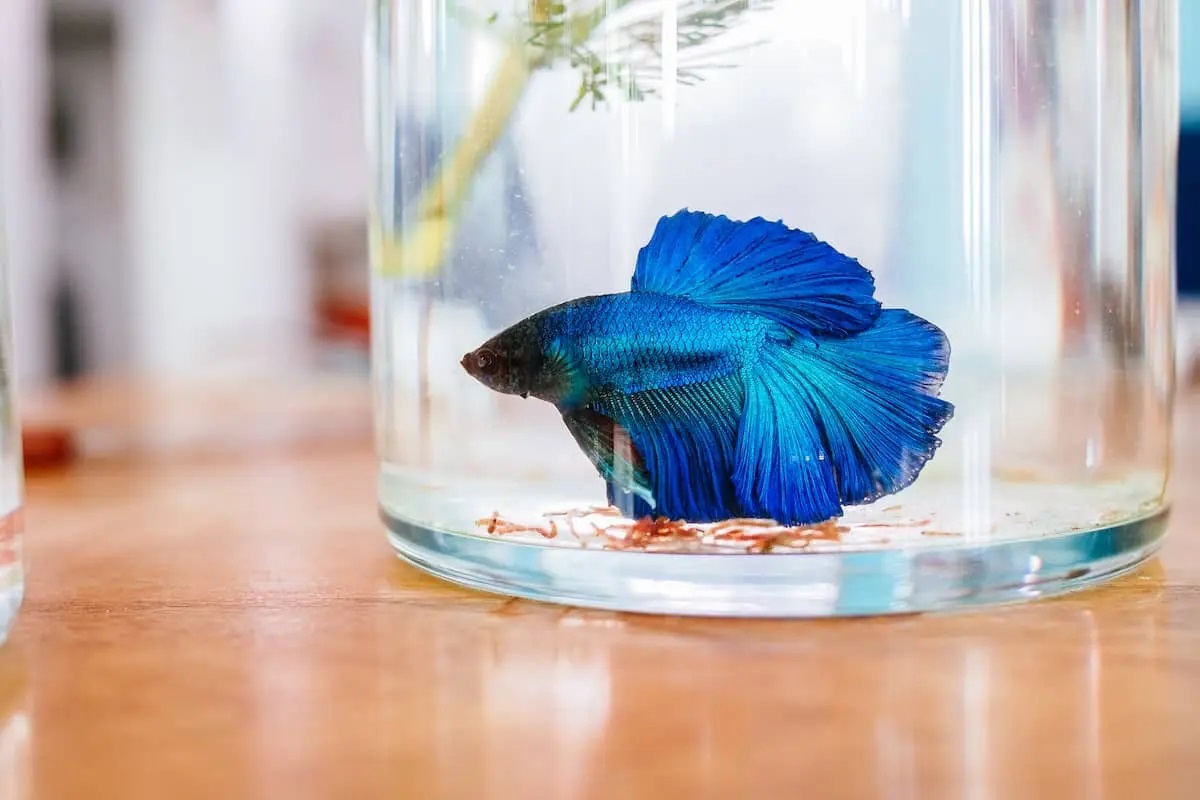Betta fish are one of the most bright and colorful species that can be kept in your home aquarium.
However, many of you may wonder: Do the Siamese fighting fish or, as they are more commonly known, betta fish grow?
In short, yes, they do.
In this article, you’ll find out how big Bettas get and how to encourage Betta fish growth. Enjoy!
Contents
How Big Do Bettas Get?
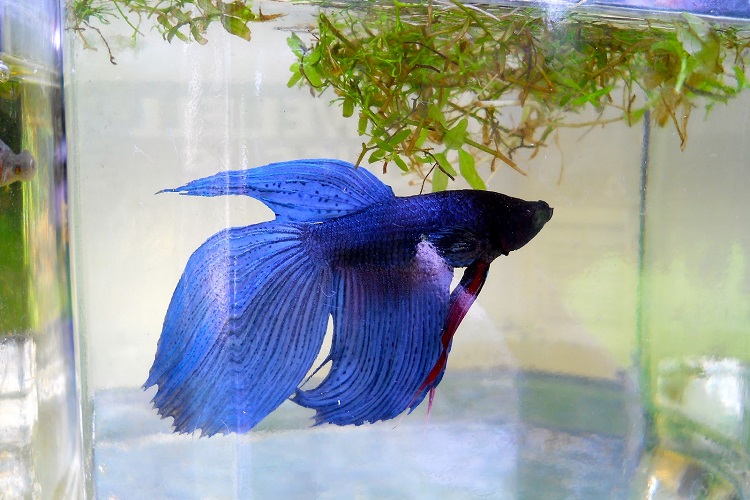
Betta fish are quite small creatures compared to other fish. Fully developed and healthy individuals can reach a maximum size of around 3 inches or 7 cm in length.
Nevertheless, their average length is actually only 2.25 inches or 5.7 cm in length.
Female bettas are approximately the same size as male bettas. However, a female betta usually has smaller fins than a male.
Of course, there are cases where Bettas grow larger, but it depends on a lot of factors. For example, if the temperature isn’t right, they can just stop growing altogether.
Also, the feeding process is very important if you want to get the maximum growth out of your little fish.
Other factors also include the fish’s genetics, the amount of sunlight and the type of food they eat, among others.
How Big Do Betta Fish Get In The Wild?
In their natural habitat bettas don’t grow as large as their brothers and sisters that are kept in pet stores or home environments. Their natural size is only 2.25 inches.
Generally speaking, tanks, plentiful food supplies, and the absence of stress really do positively impact the fish’s length. Bettas that live in the wilderness have to fight and survive every day.
Therefore, their capacity to grow is much smaller compared to those kept in a home aquarium.
Do Betta Fish Grow To The Size Of Their Tank?
Usually, tank size does have an impact on how big betta fish can get. It’s true that, in a small tank, a betta fish will stop growing at approximately 1.5 to 2 inches, no matter how much you feed them.
Although, Bettas that live in a larger tank are known to be larger and grow larger fins.
However, the size difference of a tank is not a major factor in how large Betta fish can grow. Even if you put your Betta fish in a huge tank you would only see a difference in the size of around 0.1 to 0.25 inches.
The biggest advantage of having huge tanks is not the fact that your betta fish will grow bigger. Instead, it is the ability to have more types of fish in the same tank!
Do Betta Fish Grow Fast?
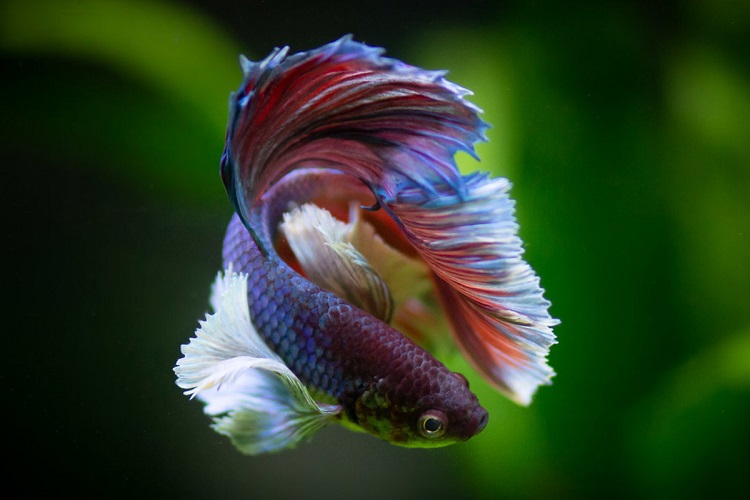
Baby bettas can reach their full growth after 6 or 7 months after birth. However, it’s not that simple.
A variety of different factors influence their growth. The most important being water quality. A Betta that lives in poor water with a lot of toxins will not be able to reach the same size as one that lives in a tank full of spring water.
Another factor that can lead to premature death and a slow rate of growth is what your Betta fish eat. If they eat a high amount of protein, they’ll grow to become big & beautiful and, most importantly, fast.
How to Make Your Betta Fish Grow Bigger?
Betta fish are usually small and hard to see in a large tank. Therefore, many people buy fully grown betta fish from their local pet store, encouraging them to grow bigger.
It is possible to achieve this, but you have to follow strict requirements in order to make your fish as big as possible.
Here is the list of the most important things to take note of that will impact your fish’s size.
Tank Size
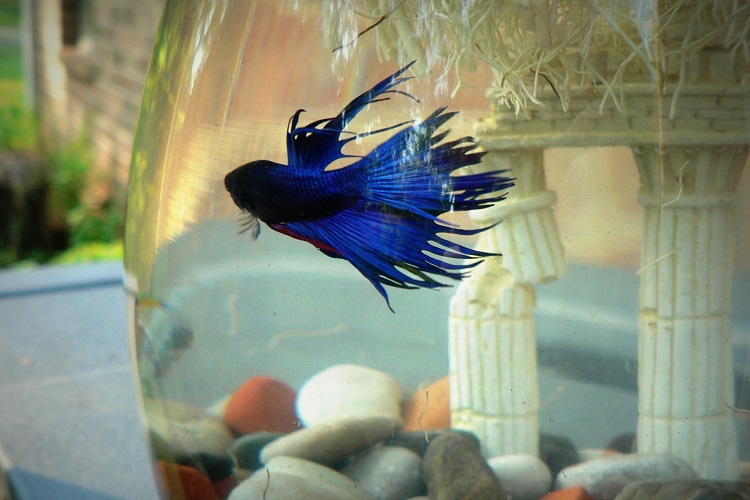
The tank size is very important. A small tank will keep your fish small.
Of course, that doesn’t mean you should buy a gigantic tank with 200 liters of water. However, if you buy the smallest tank available, prepare yourself for small betta fish with little to no growth at all.
Also, if we are talking about the tank, there are a few accessories that you’ll need to buy as well. The most important thing is a heater and a water thermometer. To thrive, you need to keep the water at 78 degrees Fahrenheit for your Betta Fish.
Also, be aware of bacteria. Buy filters that clean your tank not only by mechanical filtering but also with bacteria and chemical filtering.
The Right Food
Besides a clean and large habitat, Betta fish love diversity in their food supply. For example, you can buy freeze-dried bloodworms, brine shrimp, or other types of food rich in protein from your local pet store to keep your fish happy.
Also, Betta fish love live foods. Betta love to hunt their prey, so providing them with live food, will not only support their diet with nutritious meals but will keep them active as well.
Although giving them enough to eat is crucial, it is important to not overfeed your fish. A large dose of protein can be toxic and can lead to several internal problems for both male and female Betta fish.
Keep in mind that males always consume more protein than female betta fish. That is why males grow larger fins.
A Clean Tank
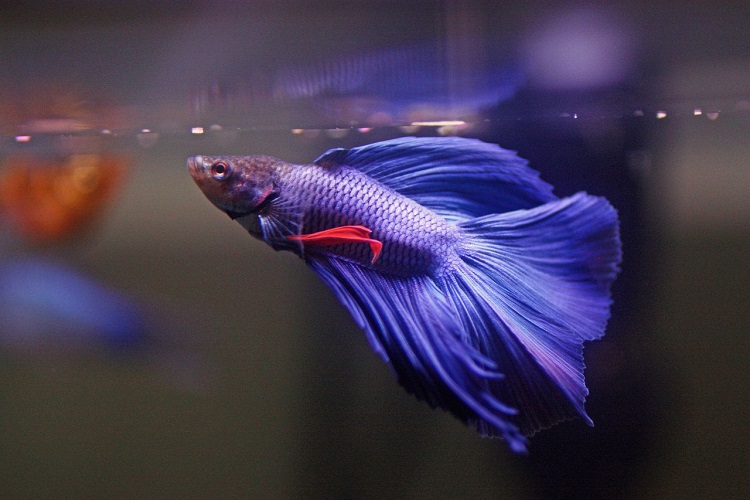
A healthy and clean tank will help support the growth of your Betta fish. Betta fish are known for their love of pristine water.
Although they are often sold in small amounts of water, king Bettas love a large amount of clear water. In order to achieve a thriving habitat, buy a water filter and clean their tank frequently.
Final Word: Do Betta Fish Grow
By now, you should have a good understanding of what it takes to set up your tank for success and help your Betta fish thrive.
Remember to provide plenty of food and clean water, as well as a healthy environment, and your Betta will be growing in no time!
Have you seen the amazing growth in your own Betta fish tank?

Ian Sterling, founder of Fishlab.com, began his aquarium journey over 30 years ago, driven by a deep fascination for fish and their diverse personalities. His website, Fishlab.com, is dedicated to making fishkeeping accessible and enjoyable, offering beginner-friendly guidance, expert insights, and a community for aquarists to connect and share experiences.


